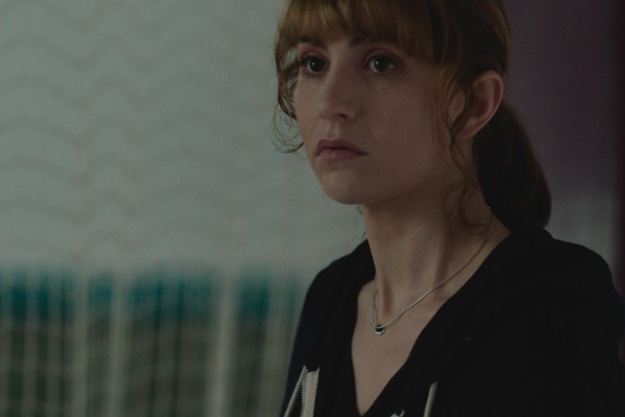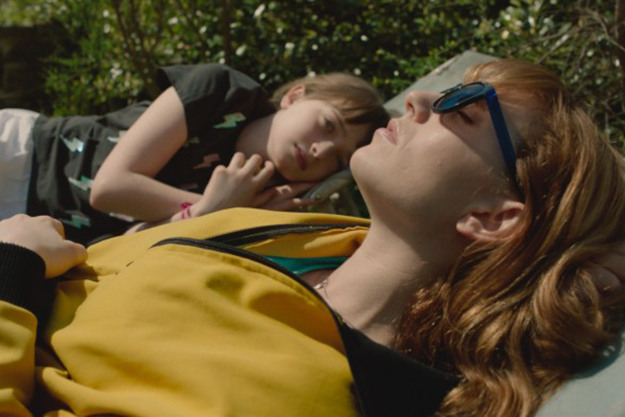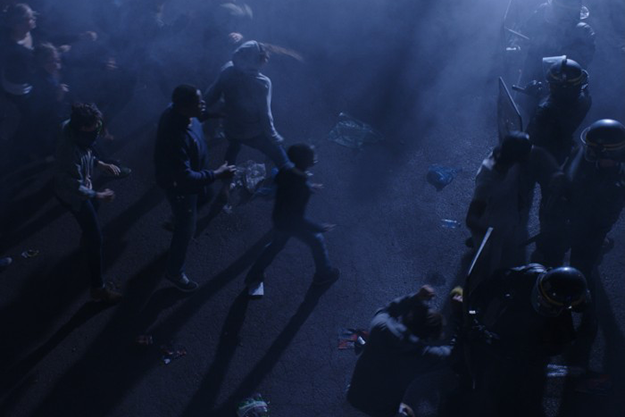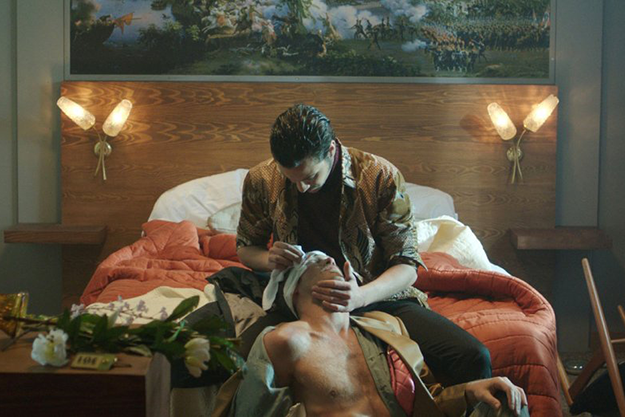Barrage It’s usually a hard-and-fast rule that any major festival contains at least two new films starring Isabelle Huppert. Berlin this year is an exception. Not that French cinema’s reigning queen of precariously suppressed inner turmoil is resting on her laurels—although, after a year that contained Elle and last year’s Berlinale hit Things to Come, who could blame her? But this year, the heavy lifting is being done instead by her daughter Lolita Chammah, who is in two films in Berlin’s Forum—Laura Schroeder’s Barrage, and next week’s Strange Birds, by Elise Girard. Chammah has certainly inherited her mother’s work ethic. Her IMDb listing includes 46 credits since the late ’80s, the first time she really registered on screen being as a wilderness dweller in Claire Denis’s The Intruder. Recent work includes Mikhaël Hers’s regrettably overlooked Memory Lane (2010), Benoît Jacquot’s Farewell My Queen (2012) and a couple of films with director Sophie Letourneur, including the title role in Gaby Baby Doll (2014). Barrage, however, is the first time I’ve caught her in a lead role, and she’s really something—all the more so because she so beautifully downplays a role that could have easily been played as a standard opportunity for grandstanding crack-up. She plays Catherine, a woman recently returned to her native Luxembourg after ten years in Switzerland—the start of the film instantly signaling a traumatic backstory that Schroeder and co-writer Marie Nimier wisely keep under wraps for a good stretch. Catherine is first seen hovering around a sports center where a young girl, Alba (Thémis Pauwels), is being coached in tennis by her strict grandmother Elisabeth—who else but Huppert herself. Alba is a precocious tennis wiz, like Catherine in her time; but just as Catherine clearly reacted badly to the ostensibly benign tyranny of her mother, it seems a safe bet that the over-protected, over-managed Alba will sooner or later go the same way too. Now her absentee mother is suddenly back on the scene, Alba doesn’t feel inclined to leave her safety zone, however repressive. It takes the accidental sacrifice of Catherine’s pet dog to bring about some sort of mother-daughter rapprochement, much to the grandmother’s disapproval.
Barrage It’s fairly standard, in French cinema and elsewhere, to see stories of damaged parents taking children on perilous AWOL trips, and in some ways Barrage doesn’t take us anywhere surprising, this particular tug-of-war being distinguished by the fact that it takes place not between two parents, but between a mother and a grandmother, and that Catherine’s abduction of Alba is a kind of revenge against her own mother. Barrage is altogether a female drama, Catherine’s benign ex hovering quietly far in the background, while Alba’s father was never identified, so effectively doesn’t exist. After a leisurely build-up, most of the action takes place at the family’s chalet surrounded by forests, where Catherine decides to camp out with her bemused daughter. The film’s title comes from a dam on the nearby river; it’s also a tennis term, match de barrage meaning “playoff.” The playoff between Chammah and Huppert is certainly relishable; they’ve teamed up before, in Laurence Ferreira-Barbosa’s La Vie Moderne (2000), and in the sprightly comic diversion Copacabana (2010), but Barrage offers a particularly crisp confrontation. Huppert glowers quietly and forbiddingly as a soul-crusher of a matriarch, but more or less takes a subdued back seat, even when she’s on screen. Chammah, meanwhile, is elusive and restrained, playing down the disturbance that we know from the start will be part of Catherine’s make-up, and making the most of her defiant, often perplexed dark eyes—as if Catherine is constantly watching her own actions, measuring her own movements, still the wary child tennis champ, despite her fall. And keep an eye on young Thémis Pauwels over the next few years: this is one of the best child performances I’ve seen of late—evoking curiosity, quietly terrified caution and (eventually) hell-for-leather rebellion with magnificent understatement. Shot unobtrusively but elegantly in Academy ratio by Hélène Louvart, the film rather downplays its cinematic qualities in favor of the drama, and when it does stick its neck out visually, it can go askew—a dream sequence seemed a big mistake, as did the image of Alba’s green-haired doll floating in water on its back (time for a moratorium on Ophelia iconography, surely). But it’s a strong, emotionally gripping piece of mainstream psychological realism; with its cast, it not surprisingly drew a full house, and gave Berlin’s first day a nice solid center.
Occidental Considerably more outré was another French-language Forum film the same day. Neïl Beloufa’s Occidental is a real oddity that will almost certainly have limited appeal, but it felt like a distinct start-of-fest tonic. It’s in that odd vein of slightly self-regarding comic distractedness that’s a very present, if marginal flavor, in French cinema right now: I’m thinking of directors like Serge Bozon, Axelle Ropert, and Benoît Forgeard, sometimes ruinously whimsy-prone but dedicated to following their own path. It also felt very much like a knowing return to the ’80s cinéma du look, sharing some of the retro perversity of Yann Gonzalez’s You and the Night (2013). I should perhaps add that it has a touch of the meta-knockabout character of another hotel-set film, Godard’s Détective. But Occidental is very much its own film—and the fact that I can’t finally pin down just what sort of film that is is part of its appeal. Also in Academy ratio (two films on the same day doesn’t yet make this a thing, but still…), Occidental is set in a hotel that is seen in flames at the start. The film then tracks back to show a collection of oddball characters hovering with intent, or just in confusion, around the hotel’s lobby and corridors before the cataclysm. There’s manager Diana (Anna Ivacheff), keeping a wary, detectively, and perhaps altogether paranoid eye on all the establishment’s comings and goings. There’s Khaled (Hamza Meziani), a porter giving to fainting spells, extravagantly zaftig receptionist Romy (the ebulliently funny Louise Orry-Diquero), who’s usually busy flirting with male guests when she’s not narrating the film in casual, thinking-of-other-things voiceover; and two male guests sharing the honeymoon suite, who arouse Diana’s suspicions because they’re supposedly Italian—but Italians don’t drink Coca-Cola, do they? Add a gaggle of obnoxious young Englishmen on a boozy stag weekend, a trio of perplexed cops, and a glamorous woman in blue who seems the walking incarnation of ’80s hair and make-up style, and the stage is set. I use that term advisedly, as Occidental does rather play up its theatrical, Feydeau-farce element. The one recognizable face here is currently favored art-house hunk Paul Hamy (from João Pedro Rodrigues’s The Ornithologist), laying on a ludicrous and very intermittent Italian accent and wearing a magnificent furry yellow coat that looks even better when accessorized with a stolen Schiaparelli pink handbag. Occidental sometimes comes across as fussy and facetious, but one thing that impresses is the way that writer-director Beloufa mobilizes so much constant business in the background and in corners of the screen, sometimes with surreptitious sneakiness. Outside the hotel, a confrontation is taking place between demonstrators and riot cops—this is one of many films we’ll be seeing over the next year about a France in crisis one way or another—but the drama happening indoors appears to be quite trivial, if not entirely imaginary, while the characters’ bickering about whether or not some remark is racist adds to the absurdity.
Occidental This is, incidentally, a magnificent piece of mise-en-scène cinema, with Beloufa and DP Guillaume le Grontec constantly finding new corners to explore of Dan Perez’s extraordinary production design, which occupies a strange niche between ’70s cheapness and ’80s gloss. Almost every name in this film was new to me, and while the neurotic snow-globe hermeticism of Occidental won’t be to every taste, the freshness is undeniable. Jonathan Romney is a contributing editor to Film Comment and writes its Film of the Week column. He is a member of the London Film Critics Circle.



